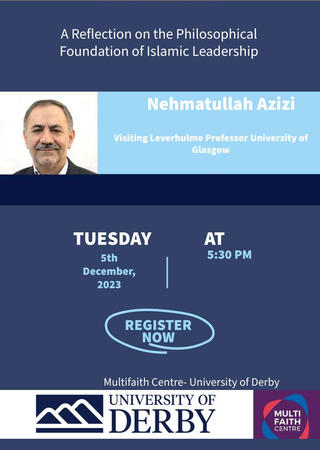
The next and 3rd Leverhulme Lecture from Professor Nematollah Azizi, University of Kurdistan, Iran and Visiting Leverhulme Professor at the University of Glasgow, entitled, A Reflection on the Philosophical Foundation of Islamic Leadership will be held on Tuesday, 5th December 2023, at 7.00 pm at the Multi-Faith Centre, University of Derby. Kedleston Road, Derby, DE22 1GB, UK.
Everyone is welcome to this lecture, and further details are attached.
Leverhulme Lecture
A Reflection on the Philosophical Foundation of Islamic Leadership
Presenter: Nematollah Azizi, University of Kurdistan, Iran
and Visiting Leverhulme Professor, University of Glasgow
Date: Tuesday, 5th December 2023, 5.30 pm
Location: Multi-Faith Centre University of Derby
Abstract
Islam is a religion that governs all matters including leadership. Leadership is an important subject that had been used to disseminate Islamic teaching or da’wah as the most significant instrument for the realization of an ideal society, based on justice and compassion, which are interrelated and which have been supported by Quran and the Sunnah of the Prophet (PBUH).
Indeed Allah commands you to deliver the trusts to their [rightful] owners, and, when you judge between people, to judge with fairness. Excellent indeed is what Allah advises you. Indeed Allah is all-hearing, all-seeing. (An-Nisa’ 4:58)
The philosophical foundation of Islamic leadership is rooted in the principles and values of Islam, a monotheistic Abrahamic religion founded in the 7th century CE by the Prophet Muhammad (PBUH). Islamic leadership, therefore, is characterized by a combination of spiritual and ethical principles that guide how leaders should govern and interact with their communities.
Islamic Leadership, rooted in Islamic principles and teachings, draws on several theoretical foundations that guide organizational and managerial practices within the framework of Sharia (Islamic law). The history of Islamic leaders gives inspirations to all leaders on how they can successfully lead multiple groups of people and many territories. From this perspective leadership is about offering oneself and one’s spirit; thus in Islam, spirituality becomes a crucial factor in addition to psychological, technical-rational and professional factors. Therefore, the basis of Islamic leadership consists of religious, moral and human sources.
Islamic leadership is a holistic and ethical approach that emphasizes service, justice, humility, compassion, and accountability. These principles guide leaders in their interactions with the community, ensuring the well-being and ethical development of society. However, it does not rely for its legitimacy upon traditional authority, but rather on rational-legal systems based on unity of purpose, acknowledgement of the one God, and the foundational example of Prophet Muhammad (PBUH), whose referent and charismatic authority lives on in discussions of the Sunnah and the Hadith. It is thus vital to refine external or “etic” characterizations of Islamic leadership with an appreciation of leadership prototypes in the Qur'an, the Sunnah and Hadith. It is also vital to refine the external or "moral" characteristics of Islamic leadership by appreciating the early examples of leadership in the Qur'an, Sunnah, and Hadith. Nevertheless, the comparison of the Islamic leadership model with contemporary leadership models shows that despite its long history, it is in many ways aligned with the recent developments in the field of management science and new scientific theories in the field of organization and management, and organizational behaviour.
In this lecture, I will focus on the philosophical basis of Islamic leadership, its impact on the expansion of Islamic civilization in a highly cultural diversified community followed by comparing the concept of Islamic leadership with recent dominant leadership models in developed societies.
Biography
![]() Nematollah Azizi is Professor of Educational Planning at the University of Kurdistan, Vice-President of the Iranian Association for Higher Education and President of the Kurdistan Association of Educational Management. He has been the UoK’s Vice-Chancellor for Research, the Dean of Faculty of Humanities and Social Sciences, the Director of Students Affairs, and the Director of Research Students in the Faculty of Humanities and Social Sciences. He was founding convenor of the Department of Education and of the Research and Teaching group on Higher Education, Curriculum Studies within the department.
Nematollah Azizi is Professor of Educational Planning at the University of Kurdistan, Vice-President of the Iranian Association for Higher Education and President of the Kurdistan Association of Educational Management. He has been the UoK’s Vice-Chancellor for Research, the Dean of Faculty of Humanities and Social Sciences, the Director of Students Affairs, and the Director of Research Students in the Faculty of Humanities and Social Sciences. He was founding convenor of the Department of Education and of the Research and Teaching group on Higher Education, Curriculum Studies within the department.
As a senior academic, having had opportunities to teach in multiple higher education systems including at the University of Kurdistan, the University of Jyvaskyla in Finland and ICD Paris Business School, he has gained extensive experience in working with highly culturally diversified student groups at undergraduate and postgraduate level. He has been responsible for redeveloping the PhD programme in Higher Education and Educational Management at the University of Kurdistan, as well as many relevant Masters degrees.
In recent years, his research focus has been on internationalization of higher education and universities’ roles in community engagement. He has been a principal investigator as well as collaborator in numerous internationally and nationally funded projects, including, recently, the British Academy Global Challenges Research Fund (GCRF)- funded project, Strengthening Urban Engagement of Universities in Asia and Africa. During his period in senior administrative positions, he has demonstrated successful collaborative leadership and supervision skills, working with colleagues from diverse sociocultural backgrounds. In addition to his senior roles in the University of Kurdistan his international connectivity, rare amongst Iranian academics, has offered him some remarkable opportunities to enrich and deepen his professional proficiencies effectively, and to offer his expertise in higher education management and in strategies that enhance community engagement for diverse academic and student groups. He has been a visiting professor at University of Bath, University of Jyvaskyla, University of Gothenburg and University of Glasgow.
He has carried out a number of consultancies for regional, national and international agencies including the Ministry of Sciences, Research and Technology, National Organization for Technical and Vocational Education and Training, and Kurdistan Council of Education. He has been an adviser and evaluator of programmes at ministerial level as well as within a number of universities. He has been a keynote speaker and chairperson at many international events.
Finally, regarding the importance of serving local communities in order to help them to flourish and to be empowered, he has been engaged proactively in founding and directing a number of NGOs and charities in Kurdistan, including the Institute of Darolehsan, and the Students Fund. He also has offered numerous workshops and courses for disadvantaged groups and individuals particularly in informal settlement areas.
Discussion topics:
- Log in to post comments













Latest Comments